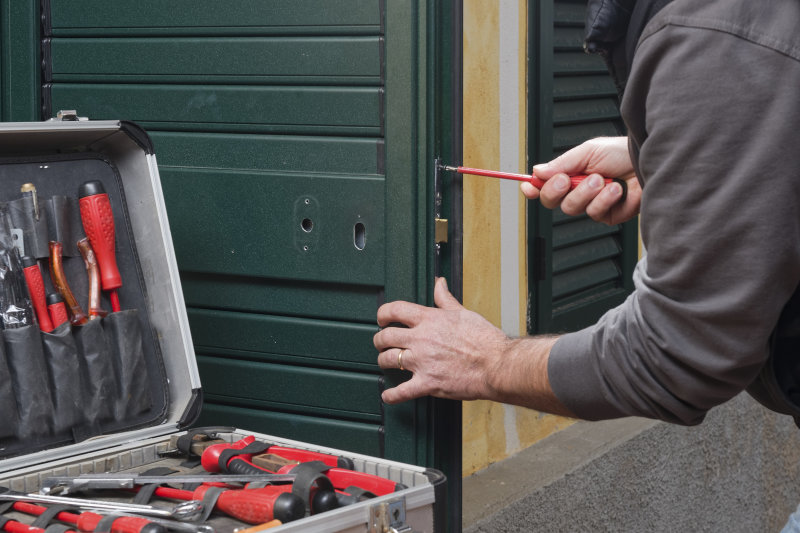The demand for 24/7 mobile locksmith services is at an all-time high. Customers increasingly rely…

Locksmith Career: Job Security & Salary Guide
The Value of Security: Is Becoming a Locksmith Worth It?
Locksmithing is an ancient profession that has been around for centuries. It is a job that requires a unique set of skills and knowledge to perform successfully. In this blog post, we will explore the ins and outs of locksmithing to help you determine whether it is a career worth pursuing. We will delve into job security, salary, and how to become a professional locksmith.
What is a Locksmith?
A locksmith specializes in installing, repairing, and adjusting locks, keys, and security systems. They are responsible for ensuring the safety and security of residential and commercial properties and automobiles. Locksmiths use various tools and techniques to perform their duties, including lock-picking, key-cutting, and programming electronic security systems.

Services Offered by Locksmiths
Locksmiths offer a wide range of services to meet the needs of their clients. Some of the most common services provided by locksmiths include:
- Residential Locksmithing: Residential locksmithing involves installing and repairing locks, rekeying existing locks, and upgrading home security systems. Locksmiths may also offer emergency lockout services for homeowners out of their homes.
- Commercial Locksmithing: Commercial locksmithing involves securing commercial properties, such as offices, retail stores, and warehouses. Services may include installing and repairing locks, upgrading security systems, and providing access control solutions.
- Automotive Locksmithing: Automotive locksmithing involves working with car locks, keys, and security systems. Locksmiths may provide services such as key duplication, repairing or replacing broken locks, and reprogramming keyless entry systems.
- Safe and Vault Services: Locksmiths with expertise in safe and vault services can install, repair, and open safes and vaults. They may also provide combination changes, lock replacements, and other security-related services for safes and vaults.
- Emergency Lockout Services: Locksmiths may offer emergency lockout services for homeowners, business owners, and vehicle owners locked out of their property or vehicle. These services are typically available 24/7 and can be a lifesaver for those needing immediate assistance.
- Key Cutting: Locksmiths can cut keys for a wide range of locks, including residential, commercial, and automotive locks. They may also offer key duplication services and advise on the best types of keys for different types of locks.
- Electronic Security Services: With the rise of smart home technology and the Internet of Things, locksmiths increasingly offer electronic security services. This can include installing and programming electronic access control systems, smart locks, and other high-tech security solutions.






Is it Worth Becoming a Locksmith?
Locksmithing is a rewarding profession for those who enjoy working with their hands, have an eye for detail, and possess good problem-solving skills. However, it is not a job for everyone. Here are some of the pros and cons of becoming a locksmith:
Pros:
- Job security: Locksmiths are always in demand, as people will always need locks and security systems installed, repaired, and maintained.
- Good earning potential: Professional locksmiths can make a good living, with salaries ranging from $30,000 to $70,000 per year, depending on experience and location.
- Flexibility: Locksmiths can choose to work as employees for a company or start their own business, giving them the flexibility to set their own schedules and work from home.
- Constant learning: The locksmithing industry constantly evolves, with new locks and security systems developed. Locksmiths must keep up with these changes to remain relevant and competitive.
Cons:
- Physical demands: Locksmithing can be physically demanding, requiring locksmiths to lift heavy equipment and work in cramped spaces.
- Work can be unpredictable: Locksmiths may receive calls at any time of the day or night to fix a lock or security system, which can disrupt their personal life.
- Can be stressful: Locksmithing can be a high-stress job, as locksmiths are responsible for ensuring the safety and security of people’s homes and businesses.
What Job Security Do Locksmiths Have?
Locksmiths have excellent job security, as locks and security systems will always be in demand. According to the Bureau of Labor Statistics, the employment of locksmiths and safe repairers is projected to grow 5 percent from 2020 to 2030, about as fast as the average for all occupations.
As long as people continue to own homes and businesses, they will need locks and security systems installed and repaired. With the rise of innovative home technology and the Internet of Things, locksmiths are expanding their services to install and program electronic security systems.
Do Locksmiths Make Good Money?
Professional locksmiths can make a good living, with salaries ranging from $30,000 to $70,000 per year, depending on experience and location. The average locksmith’s salary in the United States is around $42,000 annually. However, many factors can influence a locksmith’s earning potential, including their experience level, location, and employment status.
Locksmiths who work for large companies or government agencies typically earn higher salaries than those who are self-employed or work for small businesses. Also, locksmiths specializing in high-security systems or electronic security can command higher rates than those focusing solely on lock installation and repair.
Average Locksmith Salary by State May 2021
According to the Occupational Employment and Wage Statistics from May 2021, Locksmiths and Safe Repairers earned an average hourly wage of $22.98 and an annual mean wage of $47,810. The employment estimate for Locksmiths and Safe Repairers was 15,380, with the investigation and security services industry having the highest employment level. The top-paying industries for Locksmiths and Safe Repairers included local government, real estate, and state government. The states with the highest employment levels for Locksmiths and Safe Repairers were California, Florida, and Texas, while the highest-paying states were the District of Columbia, Wyoming, and Hawaii. Metropolitan areas with the highest employment levels were New York-Newark-Jersey City, NY-NJ-PA, and Los Angeles-Long Beach-Anaheim, CA.
Reno, NV, Boston-Cambridge-Nashua, MA-NH, and San Francisco-Oakland-Hayward, CA, were the highest-paying metropolitan areas.
- California: Hourly mean wage: $25.45; Annual mean wage: $52,930
- Florida: Hourly mean wage: $19.20; Annual mean wage: $39,930
- Texas: Hourly mean wage: $20.56; Annual mean wage : $42,770
- New York:Hourly mean wage: $27.66; Annual mean wage: $57,520
- Illinois:Hourly mean wage: $21.89; Annual mean wage: $45,530
For more information and data on Locksmiths and Safe Repairers, refer to https://www.bls.gov/oes/current/oes499094.htm
Locksmith Earning Potential
How to Become a Locksmith?
If you’re interested in becoming a professional locksmith, here are the general steps to follow:
- Complete High School or Obtain a GED
Like most professions, a high school diploma or GED equivalent is usually required to pursue a career in locksmithing.
- Complete a Training Program
Many vocational schools, community colleges, and locksmith associations offer training programs that cover the technical skills required for locksmithing, such as key cutting and lock picking. Some programs may also cover business and marketing skills.
- Obtain a License
Some states require locksmiths to obtain a license, while others have no licensing requirements. Check with your state’s licensing board to determine the specific requirements for your area.
- Gain Experience
Most locksmiths begin their careers working for an established locksmith company to gain experience and build their reputation. As they gain more experience, they can start their own businesses or work as independent contractors.
- Keep Up with Industry Developments
As technology evolves, locksmiths must keep up with new products and techniques to stay competitive. Attending industry conferences, training sessions, and workshops can help locksmiths stay up-to-date on the latest developments and best practices.
The Future of the Locksmith Industry
Locksmithing can be a rewarding career path for those with the right skills and experience. It offers job security, good earning potential, and the opportunity to work in various settings. If you are interested in becoming a locksmith, it’s important to research the requirements for your state and obtain the necessary training and certifications.
By keeping up with industry developments and offering a range of services to meet the needs of their clients, locksmiths can build successful businesses and establish themselves as trusted experts in the field. Whether you’re interested in residential, commercial, or automotive locksmithing, there are many opportunities to make a good living and build a fulfilling career in this ancient profession.



